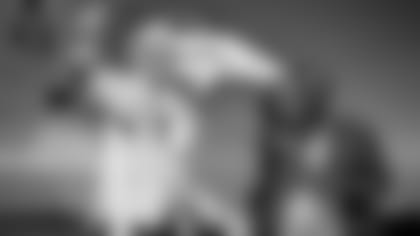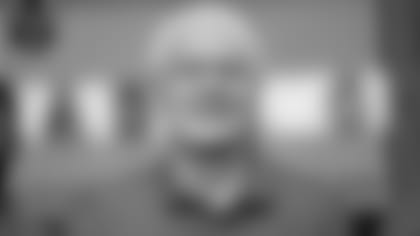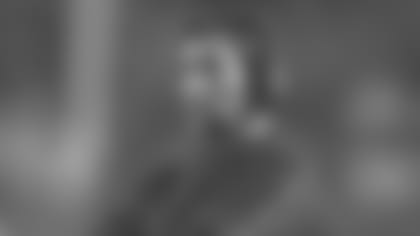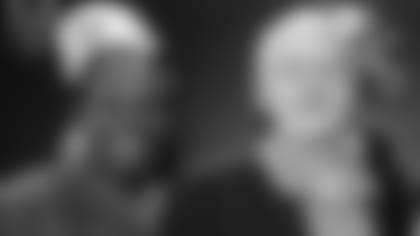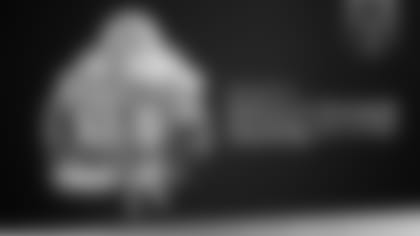CANTON, Ohio -- Everything about the timing of Champ Bailey's induction of the Pro Football Hall of Fame seems perfect, as if he was long destined for this place.
The announcement on Feb. 2 came in Atlanta, the capital city of his home state that nurtured him from birth until his years as a two-way star at the University of Georgia. The owner who brought him to Denver, Pat Bowlen, is also a part of the 2019 class.
And then came Thursday night, when the members of the class walked across the field at Tom Benson Hall of Fame Stadium, striding the 50-yard line from one sideline to the other, flanked by the Atlanta Falcons five yards to his right and the Denver Broncos standing five yards to his left.
With sunglasses on, Bailey strode with the same cool confidence that he showed as a player. At 41, he looks like he could still play, even though the little aches that linger from his playing days tell him otherwise.
He looked like a Hall of Famer.
"I'm looking around on the field, and there's only three guys that I played with," Bailey said, referring to cornerback Chris Harris Jr., outside linebacker Von Miller and defensive end Derek Wolfe. "And I go up in the coaches' booth and there's two guys up there -- Chris Kuper and Renaldo Hill and I'm like, "OK, there's something wrong here. I'm getting old.'"
"It's surreal, man."
It also took him back 15 years. His first game as a Bronco was on that field, then flanked by two sets of aging concrete stands that comprised what was known as Fawcett Stadium. He looked across the field and saw his past team, the Washington Redskins. His team of the present, the Broncos, surrounded him on the sideline.
What he didn't realize on Aug. 9, 2004 was that he saw his future, too. John Elway was there, celebrating his Hall of Fame induction that weekend. He became the first player inducted to the Hall based on his accomplishments as a Bronco. Fifteen years later, Bailey was back, set to become the first defensive player inducted based on what he did in Denver, and the second first-ballot inductee in Broncos history.
"You couldn't write a better script for this," Bailey said.
"So a lot of it's coming full circle, and bringing back old memories, being on that field, and Elway walks right in front of me, and I'm like, this is like deja vu."
Even though it reminded him of the passage of time, that moment was easy. So was the eight hours in one day he spent sitting for the construction of his bust.
"That was an experience in and of itself. I didn't know what to expect and then the guy [sculptor Blair Buswell] takes the [cover] off -- because he had been working on this before I got there -- and it already looks like me," Bailey said. "So I'm like, 'OK, well, that needs to be a little different, and he's already telling me things that look different on my face,' and I'm like, 'I see this thing every day, so how do you get it so perfect?'
"The guy was amazing. I want to see the bronze finish. I saw the clay, all that. I've got to see the bronze. There's no way he messed it up, because he was on point."
Sitting down for so long, knowing that the product of the work will linger for generations after he's gone -- you might think it would give some an opportunity to ponder a career, a legacy, a form of immortality. Or the time in the chair might lead to tedium. But that really wasn't the case.
"We were having a conversation. And I think that's the beauty of it. We were able to just sit there and talk," Bailey said. "The process went by fast. I mean, it could be tedious if he was an [objectionable person], but he wasn't, and it was a great experience."
The hard part for Bailey? Writing the speech he will read Saturday night.
"Stressful. Because when you think back to when you were a kid and you try to include everybody, it's hard. I mean, there's no way I'm going to include everybody that I should be thanking," Bailey said.
"As I sit here now and I think about it, I can think of five people that I need to put in there, but I can't do it. I don't want to go back and try to do that. There's a reason that it played out the way it is. I'm just glad they're able to put some names on the screen so I can at least acknowledge as many people as possible."
Bailey will give that speech in the gold jacket that the Hall of Fame will bestow upon him at a Friday evening dinner in Canton. After this weekend, all that will be left is the presentation of the Hall of Fame ring, which he will receive at the Broncos' game against the Tennessee Titans on October 13.
Picking up a coat and a ring is easy. But it also causes a dilemma. When do you wear the jacket? When do you wear the ring? Some inductees, like Terrell Davis, don their gold jacket so often it shows signs of wear and tear.
"Well, I've seen a lot of guys wearing theirs, so I'm assuming I'm going to wear it a lot," he said. "I don't know. I really don't know. It's funny because now I'm thinking, like, 'Every event, do I have to wear my yellow jacket? Or do people just know that I'm a Hall of Famer?' I mean, how do I walk in the room?"
Then Bailey was reminded of the ring. "Exactly!" he replied.
Others have noted that the ring is perhaps more valuable than a Super Bowl ring because of the scarcity of the honor. In some years, there are more Super Bowl rings issued to players, coaches and staff of the winning organization than members of the Pro Football Hall of Fame.
The ring made him think again about how often he will wear the jacket.
"You know, I think I'll use it when necessary," he said.
Bailey will treasure the jacket and ring. But as he showed Thursday night, and as he demonstrated for 15 seasons, he doesn't need either of them to have the regal bearing of a Hall of Famer. Just walking into the room is enough.










